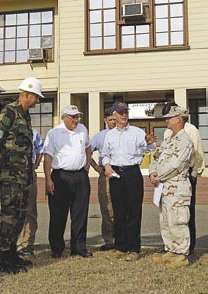Designated Civilian Official

The Designated Civilian Official (DCO) was the title of the civilian appointed to head the Office for the Administrative Review of Detained Enemy Combatants (OARDEC).[1][2][3] The position was officially an appointment by the United States President, that required confirmation by the United States Senate.[4] The DCO and OARDEC were officially created on June 23, 2004.
Gordon R. England was the designated civilian official from June 2004, until newly elected President Barack Obama replaced OARDEC with a multi-agency Guantanamo Review Joint Task Force.
Announcement
Gordon R. England, whose primary job was then to serve as United States Secretary of the Navy, was appointed to be the first Designated Civilian Official.[1]
During the June 23, 2004 press conference where he described his new position, England was asked about how he would handle the additional responsibilities of this position, and how independent he would be.[2] He repeated that his decisions would not be influenced by the Secretary of Defense, or other more senior officials. England said human rights groups, like the International Committee of the Red Cross, and other agencies of the United States Government, had been consulted in as the Review process was being designed.[2]
The Center for Constitution Rights published an analysis of the DCO's role on May 19, 2004.[5] "The entire review procedure is inadequate and illegal," stated Rachel Meeropol, an attorney at CCR. According to Michael Ratner:
- ...The DCO can order continued detention based on his or her opinion that the detainee 'remains a threat to the United States' or 'if there is any other reason that it is in the interest of the United States and its allies' for the detainee to remain in detention'.
Duties
In testimony before a subcommittee of the Senate Armed Services Committee Admiral James McGarrah, the senior officer in OARDEC said: "Secretary England as the designated civilian official is the final decision maker for this process."[4][6][7]
References
- 1 2 Jacquelyn S. Porth (June 24, 2008). "Status of Detainees in Guantanamo to be Reviewed Annually". United States Department of State. Retrieved 2008-03-26.
- 1 2 3 Gordon England (June 23, 2008). "Special Defense Department Briefing with Secretary of The Navy Gordon England". United States Department of Defense. Retrieved 2008-03-26.
- ↑ "Navy Secretary to Oversee Enemy Combatant Admin Review". United States Department of Defense. June 23, 2008. Retrieved 2008-03-26.
- 1 2 Michael William Lewis; Geoffrey S. Corn (2009). The war on terror and the laws of war: a military perspective. Oxford University Press. p. 108. ISBN 9780195389210. Retrieved 2012-09-03.
The ARB made its recommendation on retention to a esignated civilian official or "DCO", who is "a presidentially appointed Senate-confirmed civilian in the Department of Defence whom the Secretary of Defense has designated to operate and oversee the administration...
- ↑ Michael Ratner; Ellen Ray; Anthony Lewis (2004). "Guantanamo: What the World Should Know". Chelsea Green Publishing. pp. 58, 157–158. ISBN 9781931498647. Retrieved 2012-09-03.
- ↑ "Review of Department of Defense detention and interrogation policy and operations in the Global War on Terrorism: hearings before the Committee on Armed Services and Subcommittee on Personnel of the Committee on Armed Services, United States Senate, One Hundred Ninth Congress, first session". U.S. General Publishing Office. 2006. pp. 176–177. Retrieved 2012-09-03.
- ↑ "SecNav to oversee enemy combatant admin review" (PDF). Hawaii Navy News. 2004-07-02. p. 7. Archived from the original on 2012-09-03. Retrieved 2012-09-03.
As the designated civilian official, England will operate and oversee the review process to assess whether each detainee held by the Department of Defense at Guantanamo should be released, transferred or should continue to be detained.